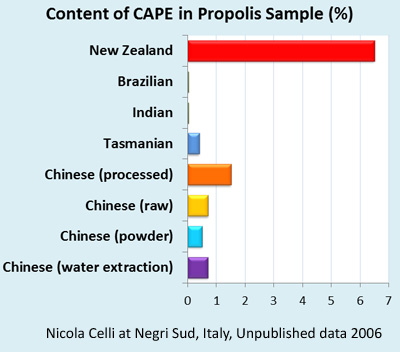Home >> Honey Articles >> BIO30 and PFL Propolis
BIO30 and PFL Propolis - Get Information and Buy the Best Products
Posted September, 2012 by Aliveplushoney
If you're interested in buying propolis for health reasons, you may have noticed that there are a couple of different trademarks or standards being used on some of the main propolis products. This is quite similar to the Manuka honey certification where there are 2 main standards used, UMF and MGO.
It can be a bit confusing for consumers to decipher what these terms actually mean and which product is the best to use.
When it comes to Propolis, the 2 terms you are likely to encounter are PFL (Propolis Flavonoid Level), and BIO30. Both these terms are used to indicate that the product has a substantial amount of the bioflavonoids which are essentially the active ingredients that make propolis beneficial to your health.
There isn't a whole lot of information on the internet about these terms, but they are not industry wide standards and are not used across many brands like UMF is used across many competing Manuka honey brands. PFL is a trademark of the company Comvita and they use it to highlight the quality of their propolis products. BIO30 is a trademark registered to Manuka Health Ltd, and similarly, they use it to market their propolis range.
How to Compare Propolis Products:
If you want to ensure you are buying a Propolis product that contains a high level of Bioflavonoids, you need to look at how much flavonoid content there is. BIO30 indicates there will be at least 30mg/g of bioflavonoids, whereas PFL indicates how many mgs of flavonoids are contained in each dose. PFL15 will have 15mg of flavonoids per dose, a dose of PFL30 will contain 30mg.
Why is the Flavonoid Content Important?
Flavonoids are a certain type of antioxidant and are thought to have a number of positive effects on health. As Propolis is a substance that bees gather from trees and other plant materials, the environment in which the bees live has a huge effect on the flavonoid content and the propolis quality. It has been found that New Zealand propolis has much higher flavonoid levels than that of other countries. This is due to New Zealand's unique history of isolation and the vast areas of pristine plants and trees.
CAPE, something else to consider:
Caffeic acid phenethyl ester (CAPE) is a natural phenolic chemical compound that occurs naturally in Propolis and in a variety of plants. Studies have found that this compound has a number of anti-cancer effects.
As with flavonoid content, the amount of CAPE varies depending on the propolis source. The graph below is from a study that found New Zealand Propolis to contain much more CAPE than Propolis from other locations.

How to Buy the Best Propolis:
To obtain the health benefits of Propolis you will need to ascertain the Flavonoid content contained and this should also provide an indication of the CAPE contained. Look for BIO30 and PFL trademarks as an indicator of quality, but don't rule out other brands that don't display these trademarks as they may also contain high flavonoid levels. Check any packaging for details of this.
As a rule of thumb, New Zealand Propolis products will generally be your best bet, as demonstrated by science. This is due to the high quality plant material the New Zealand bees live amongst.
You can buy BIO30 and PFL Propolis here.

